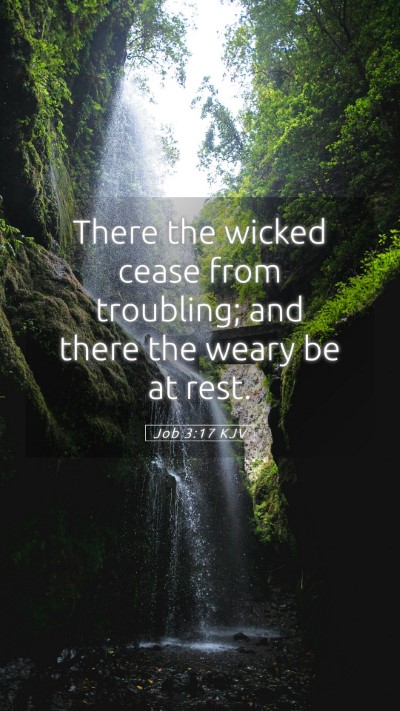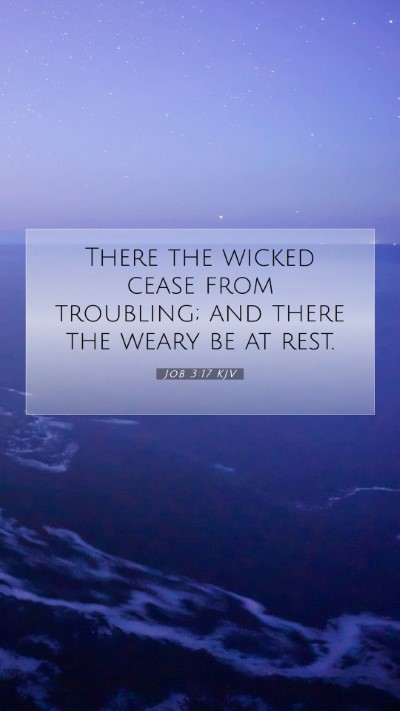Old Testament
Genesis Exodus Leviticus Numbers Deuteronomy Joshua Judges Ruth 1 Samuel 2 Samuel 1 Kings 2 Kings 1 Chronicles 2 Chronicles Ezra Nehemiah Esther Job Psalms Proverbs Ecclesiastes Song of Solomon Isaiah Jeremiah Lamentations Ezekiel Daniel Hosea Joel Amos Obadiah Jonah Micah Nahum Habakkuk Zephaniah Haggai Zechariah MalachiJob 3:17 Meaning
What is the meaning of Job 3:17?
There the wicked cease from troubling; and there the weary be at rest.
Job 3:17 Bible Verse Meaning
Understanding Job 3:17
Job 3:17 states, "There the wicked cease from troubling; and there the weary be at rest." This verse captures Job's expression of deep anguish as he wishes for death in the midst of his suffering. Below we explore the meanings behind this verse through insights from various public domain commentaries, including Matthew Henry, Albert Barnes, and Adam Clarke.
Bible Verse Meanings
This verse signifies an important moment in the Book of Job where Job reflects on the state of the dead. It offers profound insights into suffering, death, and rest.
Verse Interpretation
-
Matthew Henry's Commentary:
Henry emphasizes that Job's lament reflects the universal human desire for rest from tribulation. He notes that the phrase "the wicked cease from troubling" highlights a state of peace found only in death, contrasting with life's pains.
-
Albert Barnes' Commentary:
Barnes interprets this verse as a poignant reminder that death may bring relief to those who experience suffering. He articulates that Job sees the grave as a place where the turmoil of life is absent.
-
Adam Clarke's Commentary:
Clarke suggests that Job's expression is indicative of despair. He focuses on the emotional state of Job, suggesting that the grave is seen as a sanctuary from life's tribulations.
Bible Verse Understanding
Job’s statement reveals a deep-seated longing for an escape from suffering, which many can relate to during times of distress. This verse calls into question the purpose of suffering and the nature of rest.
Bible Verse Explanations
Job 3:17 can be interpreted as follows:
- The "wicked" refers to those who cause pain and suffering in the world, emphasizing a distinction between the righteous and the unrighteous.
- "Cease from troubling" indicates that in death, the pain inflicted by the wicked and the hardships of life come to an end.
- "The weary be at rest" suggests that those who suffer and are burdened in life find peace after death, a theme echoed throughout scripture.
Scripture Analysis
This analysis leads to various interpretations regarding the afterlife and the state of human souls. The longing for peace expressed by Job resonates with themes found in the Bible that discuss the temporary nature of earthly suffering.
Additional Insights
Job 3:17 can connect with various topics such as the problem of evil, the nature of God, and the hope of eternal life. This verse encourages readers to contemplate how suffering shapes our understanding of rest and peace.
Bible Cross References
- Psalm 37:38: "But the transgressors shall be destroyed together: the end of the wicked shall be cut off."
- Ecclesiastes 3:17: "I said in my heart, God shall judge the righteous and the wicked: for there is a time there for every purpose and for every work."
- Revelation 14:13: "And I heard a voice from heaven saying unto me, Write, Blessed are the dead which die in the Lord from henceforth: Yea, saith the Spirit, that they may rest from their labors; and their works do follow them."
Bible Study Insights
This verse can be an excellent starting point for Bible study groups focusing on the themes of suffering, rest, and justice. Through various Bible study tools, individuals can deeply engage with its implications for daily life and spiritual understanding.
Conclusion:Job 3:17 holds essential meaning in the context of suffering and the hope of repose. Its exploration through biblical exegesis allows for a comprehensive understanding of distress in life and the promise of peace in death.
For those looking to further their understanding of this verse, consider participating in online Bible study courses that address the complexities of Old Testament wisdom literature and its relevance today.


